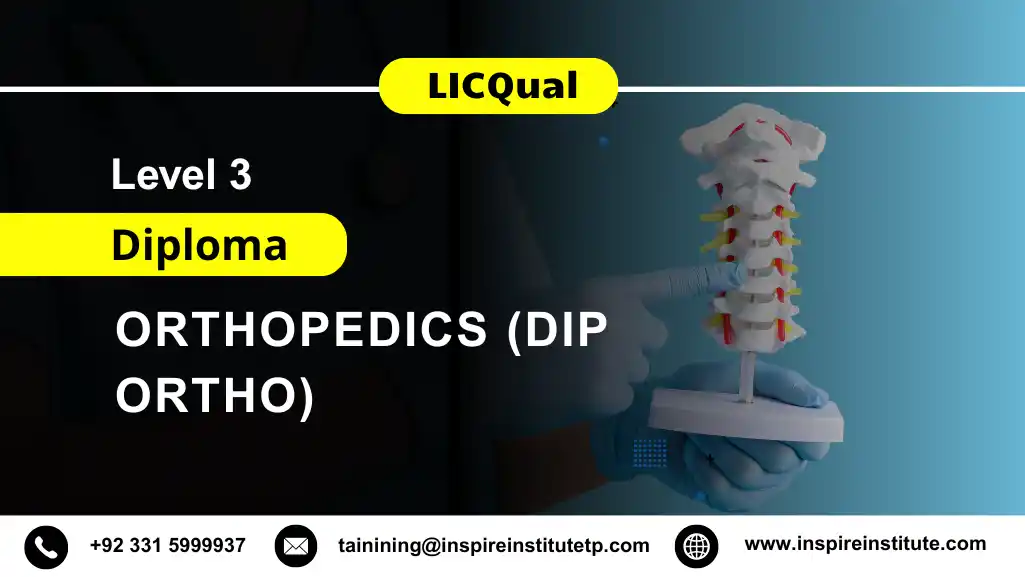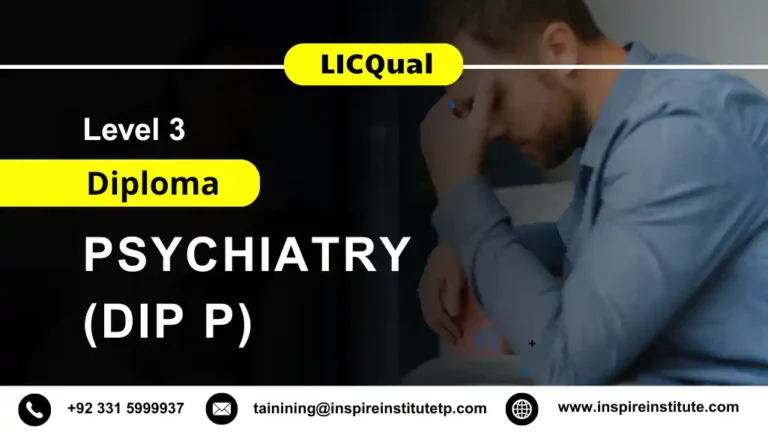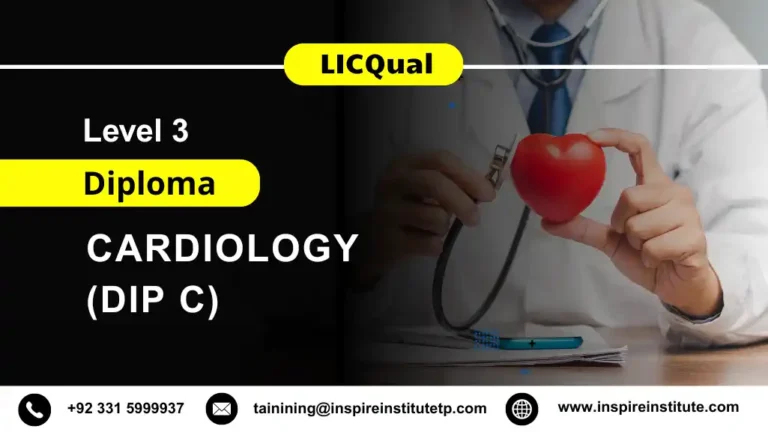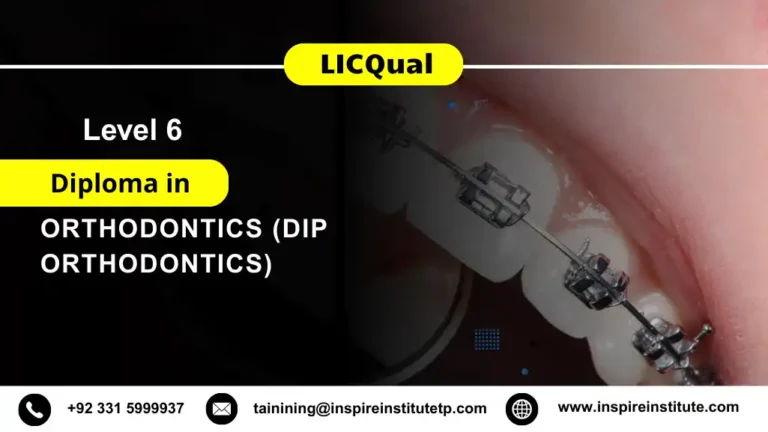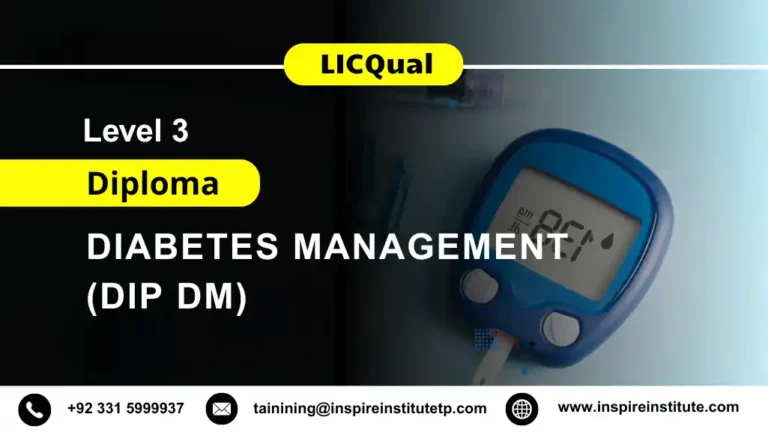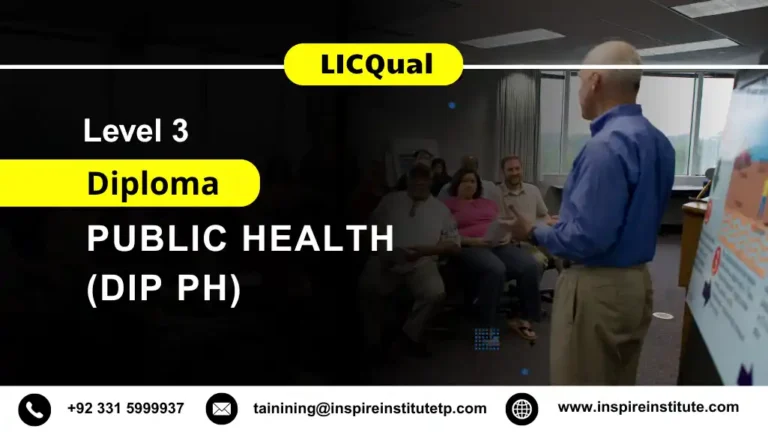LICQual Level 3 Diploma in Orthopedics (Dip Ortho)
The LICQual Level 3 Diploma in Orthopedics (Dip Ortho) is a UK-accredited qualification designed for healthcare professionals seeking to develop advanced knowledge and practical skills in musculoskeletal care, orthopaedic assessment, and patient management. Orthopedics plays a critical role in modern healthcare, addressing conditions related to bones, joints, muscles, ligaments, and connective tissues. This diploma Orthopedics provides a comprehensive foundation in both the theoretical principles and practical applications of orthopaedic care, making it ideal for nurses, physiotherapists, healthcare assistants, and allied health professionals who aim to enhance their expertise in musculoskeletal health.
This assignment-based programme equips learners with a thorough understanding of musculoskeletal anatomy, biomechanics, injury assessment, and treatment strategies for common orthopaedic conditions. Participants will gain practical skills in patient evaluation, rehabilitation planning, pain management, and preventive care. The course also emphasises evidence-based practice, enabling professionals to integrate the latest research, clinical guidelines, and innovative treatment approaches into their practice. By combining theory with applied learning, learners are prepared to deliver safe, effective, and patient-centered orthopaedic care.
The LICQual Level 3 Diploma in Orthopedics (Dip Ortho) is delivered through a flexible, assignment-based format, allowing healthcare professionals to balance clinical duties with advanced study. Graduates of this diploma will enhance their professional credibility, improve clinical decision-making, and expand career opportunities in hospitals, clinics, rehabilitation centers, and community healthcare settings. By completing this programme, learners strengthen their ability to assess musculoskeletal disorders accurately, implement evidence-based interventions, and contribute to improved patient outcomes, establishing a strong foundation for further specialization or leadership roles in orthopaedic healthcare.
This diploma Orthopedics essential for healthcare professionals seeking to advance their knowledge, skills, and career prospects in the growing field of musculoskeletal and orthopaedic care.
Why Choose this Qualification
The LICQual Level 3 Diploma in Orthopedics (Dip Ortho) is a UK-accredited qualification designed for healthcare professionals seeking to enhance their knowledge and practical skills in musculoskeletal care, orthopaedic assessment, and patient management. This course combines advanced theoretical learning with practical applications, enabling learners to understand the anatomy, biomechanics, injury assessment, and treatment strategies essential in modern orthopaedic care. Designed as an assignment-based programme, it provides flexibility for professionals balancing clinical responsibilities with further education.
Key Reasons to Choose this Qualification:
Specialist Knowledge: Gain a comprehensive understanding of musculoskeletal anatomy, joint function, bone and ligament injuries, and common orthopaedic conditions. Learn evidence-based approaches to diagnosis, treatment planning, rehabilitation, and preventive care. This knowledge equips professionals to deliver safe, effective, and informed patient care.
Practical Application: Develop competence in patient assessment, musculoskeletal examination, injury management, and rehabilitation planning. Learners also gain skills in pain management, mobility support, and evidence-based intervention strategies, ensuring practical application in clinical and community healthcare settings.
UK-Accredited Diploma: Earn a UK-recognised qualification that validates advanced expertise in orthopaedic care and enhances professional credibility. Accreditation ensures alignment with international healthcare standards, making this diploma valuable for nurses, physiotherapists, healthcare assistants, and allied health professionals.
Flexible Learning Pathway: Benefit from an assignment-based structure that allows learners to progress at their own pace while continuing to work in clinical environments. This format supports busy healthcare professionals seeking academic advancement without interrupting patient care.
Evidence-Based Training: Explore current research, clinical protocols, and best practices in orthopaedic care. The programme emphasises safe, effective, and evidence-driven approaches, enabling learners to apply modern techniques in musculoskeletal assessment and management.
Career Development: Expand career opportunities in hospitals, clinics, rehabilitation centers, and community health services. The LICQual Level 3 Diploma in Orthopedics equips learners with the expertise to contribute to improved patient outcomes and professional growth within the healthcare sector.
The LICQual Level 3 Diploma in Orthopedics (Dip Ortho) empowers healthcare professionals with the knowledge, skills, and UK-accredited recognition necessary to deliver high-quality, evidence-based orthopaedic care. It is an essential qualification for those looking to advance their careers while improving patient outcomes in the field of musculoskeletal health.
Course Overview
LICQual UK Awarding Body
Average Completion Time:
4-12 Months
Study Units: 6 Units
Evidence & Assignment Based
Mandatory Units
Who Should Take This Course
The LICQual Level 3 Diploma in Orthopedics (Dip Ortho) is a UK-accredited qualification designed for healthcare professionals who wish to develop advanced knowledge and practical skills in musculoskeletal care, orthopaedic assessment, and patient management. This course is ideal for practitioners aiming to improve patient outcomes, implement evidence-based treatment strategies, and progress within the specialised field of orthopaedics. It equips learners with in-depth theoretical insights and practical approaches to musculoskeletal anatomy, injury assessment, rehabilitation planning, and patient education, supporting both professional growth and improved quality of care in clinical settings.
This course is suitable for:
Nurses and Healthcare Assistants: Professionals seeking to enhance their expertise in musculoskeletal assessment, injury management, and patient education, enabling them to deliver personalised orthopaedic care with confidence.
Physiotherapists and Rehabilitation Specialists: Clinicians wishing to strengthen their skills in diagnosing musculoskeletal conditions, planning rehabilitation programmes, and supporting patient recovery to optimise outcomes.
Aspiring Specialists: Healthcare professionals preparing for higher-level qualifications or specialist pathways in orthopaedics, sports medicine, or musculoskeletal care who want to establish a strong academic and clinical foundation.
Occupational Therapists and Support Staff: Practitioners aiming to develop competencies in mobility support, injury prevention, and rehabilitation strategies to contribute effectively within multidisciplinary care teams.
Healthcare Educators and Trainers: Professionals interested in advancing their knowledge of orthopaedics to support teaching, research, or evidence-based training within healthcare education.
Healthcare-Oriented Learners: Individuals with a professional interest in musculoskeletal health who wish to understand the principles, assessment techniques, and impact of orthopaedic care on patient mobility, function, and overall well-being.
The LICQual Level 3 Diploma in Orthopedics (Dip Ortho) is particularly valuable for healthcare professionals seeking to specialise in musculoskeletal care, strengthen their clinical expertise, and achieve a UK-accredited qualification. By combining evidence-based learning with practical application, this diploma supports career progression, professional recognition, and the ability to meet the growing demand for skilled orthopaedic practitioners in modern healthcare.
Course Benefits
The LICQual Level 3 Diploma in Orthopedics (Dip Ortho) provides substantial benefits for healthcare professionals seeking to enhance their expertise in musculoskeletal care, injury management, and rehabilitation. By combining advanced theoretical knowledge with practical application, this diploma equips learners to assess, diagnose, and support patients with orthopedic conditions effectively. Designed as a flexible, assignment-based programme, it fosters professional development while maintaining clinical and academic excellence in modern orthopedic practice.
Key Benefits of the Course:
- Specialist Knowledge: Gain a comprehensive understanding of orthopedic anatomy, musculoskeletal physiology, injury mechanisms, and common orthopedic conditions. Learners explore fracture management, joint disorders, orthopedic interventions, and rehabilitation principles, enabling evidence-based decision-making and improved patient care.
- Practical Application: Develop competence in assessing musculoskeletal injuries, implementing treatment plans, supporting rehabilitation strategies, and applying preventive care techniques. Learners also gain skills in patient evaluation, collaborative care, and practical interventions to ensure effective clinical application.
- Recognised Qualification: Earn a UK-accredited diploma that validates advanced expertise in orthopedics and opens professional opportunities in hospitals, clinics, physiotherapy centres, and educational institutions. Accreditation ensures alignment with international healthcare standards and best practices.
- Flexible Learning Pathway: Benefit from an assignment-based study structure that allows learners to progress academically while managing professional responsibilities. This flexible format is ideal for busy healthcare practitioners balancing patient care with further education.
- Evidence-Based Training: Explore the latest research, clinical protocols, and guidelines in orthopedic care, ensuring safe, effective, and evidence-driven practice. Learners are trained to adopt modern assessment and rehabilitation techniques while promoting patient safety and optimal recovery outcomes.
- Career Development: Expand career pathways as a healthcare professional with advanced orthopedic expertise, pursue specialist training, or take leadership roles in clinical care and education. This qualification strengthens employability in both clinical and academic environments.
- Enhanced Patient Care: Contribute to improved patient outcomes through accurate assessment, evidence-based treatment, and patient-focused rehabilitation. The ability to manage musculoskeletal conditions effectively enhances long-term health and functional recovery.
- Professional Growth: Strengthen clinical skills, patient communication, and interdisciplinary collaboration. This diploma prepares healthcare professionals to play a key role in orthopedic care, improving care quality and patient safety.
The LICQual Level 3 Diploma in Orthopedics (Dip Ortho) equips learners with advanced knowledge, practical skills, and a UK-recognised qualification. It empowers healthcare professionals to expand their expertise, deliver better patient outcomes, and pursue career progression while addressing the growing demand for skilled orthopedic care specialists.
Eligibility Criteria
The LICQual Level 3 Diploma in Orthopedics (Dip Ortho) is a UK-accredited programme designed for healthcare professionals who wish to enhance their expertise in musculoskeletal care, orthopedic assessment, and patient rehabilitation. This assignment-based qualification combines advanced theoretical knowledge with practical application, making it ideal for nurses, physiotherapists, general practitioners, and healthcare educators aiming to develop specialist skills in orthopedic care. By meeting the entry requirements, learners ensure they are fully prepared to succeed in the programme and apply their knowledge confidently in clinical and community healthcare settings.
Educational Background:
Applicants must hold a recognised healthcare qualification such as a nursing degree, diploma in healthcare practice, physiotherapy qualification, or an equivalent credential. Those with Level 2 or Level 3 qualifications in healthcare or related fields may also be considered. Equivalent international qualifications will be reviewed on a case-by-case basis to ensure suitability for the programme.
Professional Experience:
A minimum of one year of clinical or community healthcare experience is recommended. Prior exposure to orthopedic care, musculoskeletal assessment, or rehabilitation practices is advantageous, though motivated healthcare professionals without direct orthopedic experience may also apply.
Age Requirement:
Learners must be at least 18 years of age at the time of enrolment, ensuring they possess the professional maturity, responsibility, and clinical judgment required for advanced training.
Language Proficiency:
Since the programme is delivered in English, learners should demonstrate proficiency in reading, writing, and communication. A minimum IELTS score of 6.0 or an equivalent qualification is recommended for non-native English speakers to ensure they can complete assignments and fully engage with course materials.
Technical Requirements:
Applicants should have access to a computer or laptop with a stable internet connection, as well as basic IT skills to manage digital resources, research, and assignment submission through online platforms.
Required Documents:
Submission of a valid ID or passport, proof of educational qualifications, and evidence of professional experience (if applicable) is necessary for registration. Additional documentation may be required for learners presenting international qualifications.
The Qualification Process
LICQual Level 3 Diploma in Orthopedics (Dip Ortho) follows a structured pathway to ensure learners gain comprehensive knowledge, practical skills, and professional competence in community oral healthcare.
Step 1: Self-Assessment
Learners review the entry requirements to confirm eligibility. Candidates with a background in dentistry, oral health, or public health are encouraged to apply.
Step 2: Registration
Complete the registration process by submitting required documents such as proof of qualifications, a valid ID, and payment of enrollment fees.
Step 3: Induction
An induction session is conducted to:
- Verify learner eligibility and documentation.
- Introduce study materials, learning outcomes, and assessment procedures.
Step 4: Learning and Evidence Submission
Learners complete assignments, case studies, and practical exercises demonstrating competence in public health dentistry, community oral health assessment, preventive strategies, and program planning.
Step 5: Feedback and Revision
Assessors review submitted evidence and provide constructive feedback. Learners can revise and resubmit work to meet all required standards.
Step 6: Competence Validation
Final submissions are evaluated to confirm that learners have met all theoretical and practical learning outcomes.
Step 7: Internal Quality Assurance (IQA)
The IQA team reviews the assessment process to ensure accuracy, fairness, and compliance with international standards.
Step 8: External Verification (EQA)
External verifiers validate the authenticity and quality of learner achievements.
Step 9: Certification
Upon successful verification, learners are awarded LICQual Level 3 Diploma in Orthopedics (Dip Ortho) , demonstrating advanced proficiency in community oral healthcare and preparing them for professional growth in dental public health, preventive dentistry, and healthcare policy.

